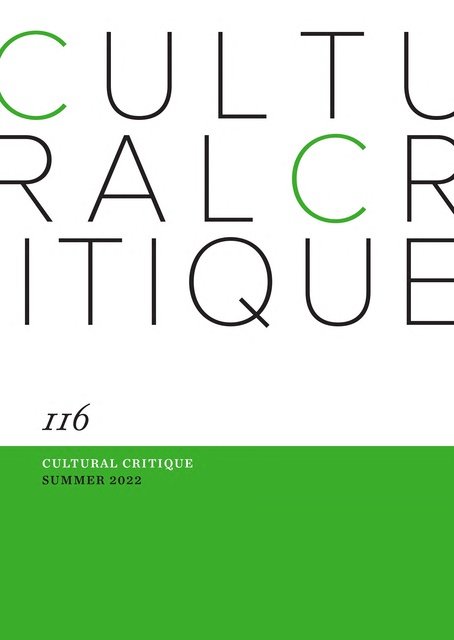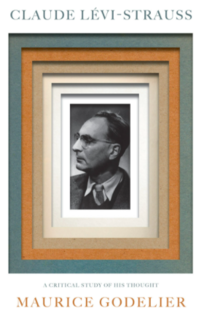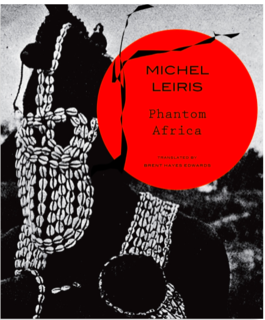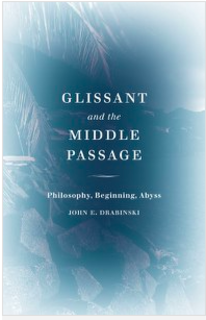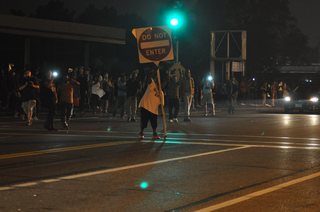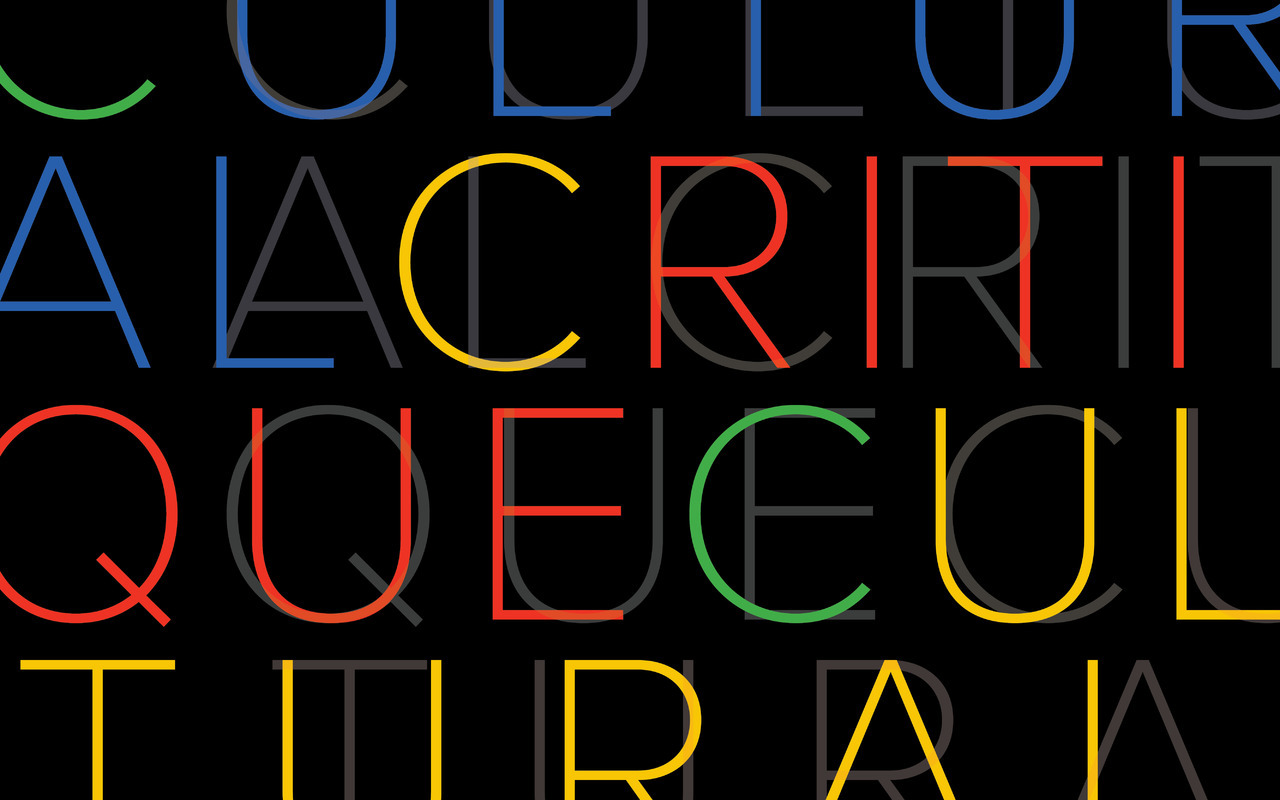
Cultural Critique Online
Issue 116, Frame 1
Welcome to Cultural Critique Online, the open-access online section of Cultural Critique. This journal provides a forum for creative and provocative scholarship in the theoretical humanities and humanistic social sciences. Transnational in scope and transdisciplinary in orientation, the journal strives to spark and galvanize intellectual debates as well as to attract and foster critical investigations regarding any aspect of culture as it expresses itself in words, images, and sounds, across both time and space. The journal is especially keen to support scholarship that engages the ways in which cultural production, cultural practices, and cultural forms constitute and manifest the nexus between the aesthetic, the psychic, the economic, the political, and the ethical intended in their widest senses. While informed by the diverse traditions of historical materialism as well as by the numerous critiques of such traditions from various parts of the globe, the journal welcomes contributions based on a variety of theoretical-methodological paradigms. Cultural Critique Online on Manifold expands Cultural Critique’s existing web presence to include new open-access book reviews, short articles, interviews, and more.
Cover design by Jeenee Lee
Texts
Reviews
- This text has 0 annotations
- This text has 41 highlights
- This text has 0 annotations
- This text has 0 highlights
- This text has 0 annotations
- This text has 0 highlights
Essay
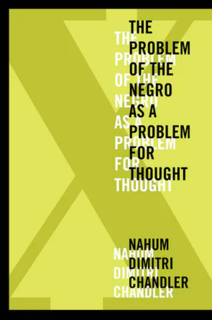
Revisions of OntologyOn Nahum Dimitri Chandler’s “X—The Problem of the Negro as a Problem for Thought”
Gayatri Chakravorty Spivak“Revisions of Ontology” demonstrates how Nahum Dmitri Chandler uses early Derrida and Hortense Spillers, and of course his own considerable reading skills, to establish that W.E.B. Du Bois’s work shows that difference is ontologically irreducible. It dwells at length on Chandler’s staging of the aporia of exemplarity in Du Bois’s diversified use of autobiography as argument. It comments on the individual readings at length and critically. It comments on “between”-ness as it is taken as the structure of feeling of all that Du Bois wrote. It shows how Chandler shows that, for Du Bois, “double consciousness” is not only a loss but also the gain of a “second sight.” It reveals how the name “African-American” emerges as a catachresis to name the global subject of an undecidable and indefinite future. It unfolds Chandler’s perceptive reading of Du Bois’s reading of John Brown as African-American.
- This text has 0 annotations
- This text has 0 highlights
In the Conjuncture
- This text has 0 annotations
- This text has 0 highlights
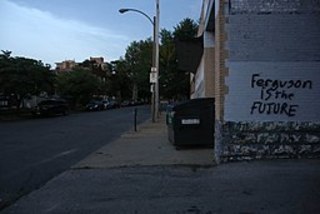
From “Plessy” to Ferguson
George LipsitzThe killing of Michael Brown in Ferguson, Missouri, in 2014 and the responses to it evidence a long-standing pattern in U.S. law, history and culture of not only condoning injustice but disavowing its very existence. The many miscarriages of justice in this case reveal that the nation has never really moved beyond the forms of racial domination articulated in the Dred Scott and Plessy Supreme Court cases decided during the regimes of slavery and Jim Crow segregation. When considered in the context of how the racialization of space and the spatialization of race create cumulative vulnerabilities for aggrieved individuals and groups, what transpired during and after the killing of Michael Brown is only one more instance of slavery unwilling to die.
- This text has 0 annotations
- This text has 0 highlights

Michael Brown, Ferguson, and the Ghosts of Pruitt-Igoe
Roderick A. FergusonThe roots of Michael Brown’s murder lie partly in the contentious struggles around the Pruitt-Igoe housing complex, a struggle that produced the discursive and material conditions whereby black life in the St. Louis suburbs would be degraded and managed by white authorities.
- This text has 0 annotations
- This text has 0 highlights
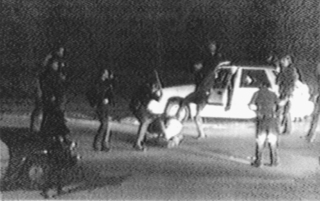
Street/CrimeFrom Rodney King’s Beating to Michael Brown’s Shooting
Paula RabinowitzMore than twenty years ago, video of four police officers beating Rodney King seemed proof positive of brutality by predominantly white police forces against African American citizens. However, in their trial for the beating, the four defendants successfully used the tape, examined frame by frame, to argue that Mr. King was the aggressor. Their acquittal sparked a violent uprising in Los Angeles. Once again, after the shooting of Michael Brown by a white police officer, images of the demonstrations responding to widespread police violence in the black community rerouted guilt away from the perpetrator, who was exonerated by a grand jury, and onto those expressing their rage on the streets.
- This text has 0 annotations
- This text has 0 highlights

In the Wake
Paul YoungquistThis essay offers a historical meditation on the death of Michael Brown. It situates contemporary violence against blacks in the legacy of chattel slavery, invoking the incident of the slave ship Zong to help explain the abandonment to violence of black life. The work of Giorgio Agamben provides a theoretical backdrop to help account for its frequency. The meditation ends with an instance of found poetry derived from the official report of Michael Brown’s autopsy.
- This text has 0 annotations
- This text has 0 highlights

Unbearable Blackness
Jared SextonThis article offers an appreciation of the political problems confronting the “Black Lives Matter” campaign against anti-black state violence in and beyond the United States, especially regarding the question of multiracial solidarity. It suggests that a black feminist conceptualization of reproductive justice offers the most adequate framework for explaining the culture and institution of policing. In legal determinations of life and death, the history of racial slavery presents an aporia running across the political spectrum, generating a range of figurative peculiarities in the modern discourse of freedom. The contemporary “pro-life” movement provides a case in point.
- This text has 0 annotations
- This text has 6 highlights
Metadata
- container title
- issn1534-5203
- publisherUniversity of Minnesota Press
- publisher placeMinneapolis, MN
- restrictionsAll rights reserved. No part of this publication may be reproduced, stored in a retrieval system, or transmitted, in any form or by any means, electronic, mechanical, photocopying, recording, or otherwise, without the prior written permission of the publisher.
- rightsCopyright 2022 by the Regents of the University of Minnesota
- rights holderRegents of the University of Minnesota


